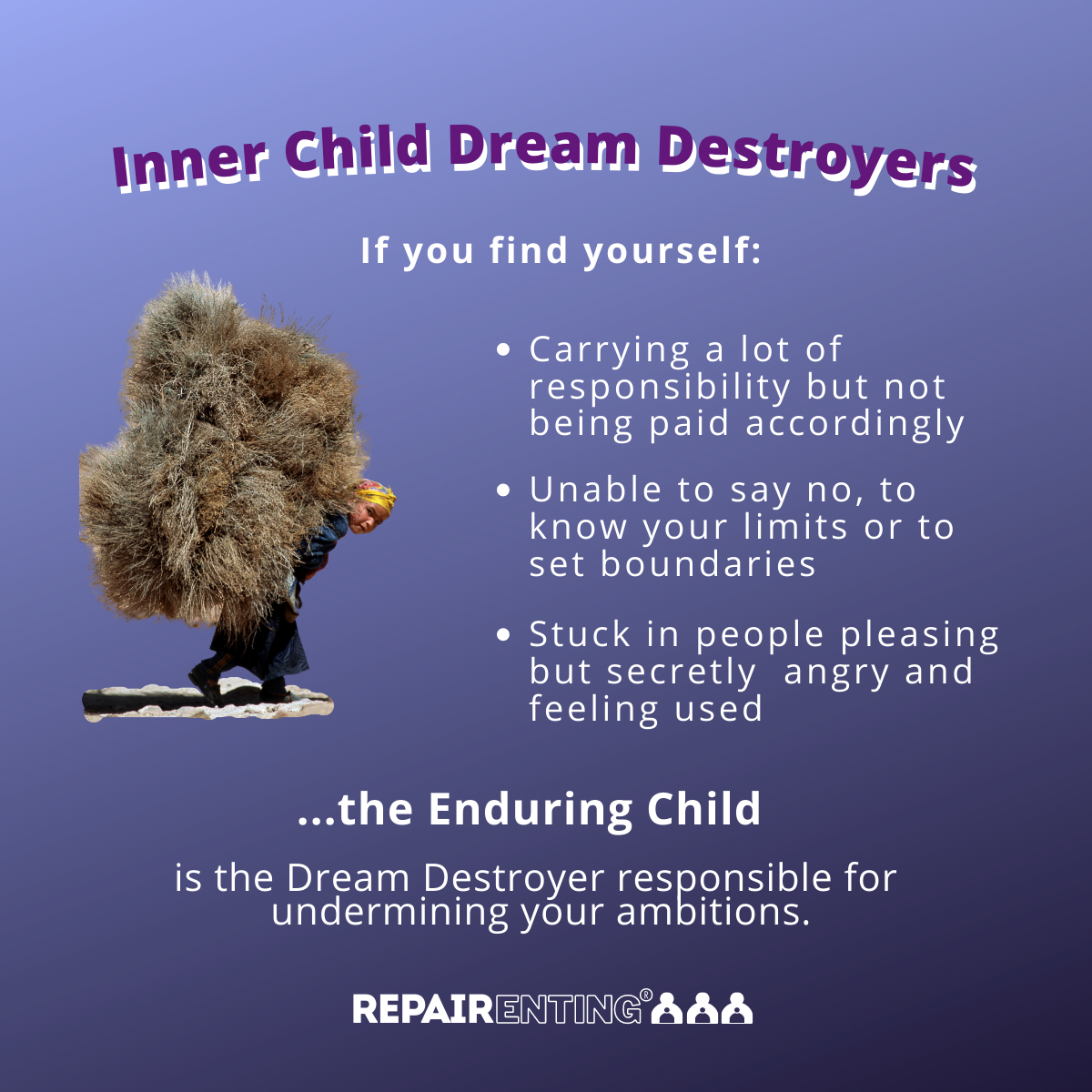| Back to Back Issues Page |
 |
|
REPAIRenting® Academy May 13, 2022 |
Tricia decided to embark on my REPAIRenting® Programme because of what she called ‘stubborn imposter syndrome'. She had been offered to apply for a promotion but didn’t think she was ready for the new level of responsibility and dreaded the interview. Also, she had been anxious for many years and spent a lot of her life energy on getting by pretending everything was fine.

When I asked about work it emerged quickly that her main focus at work was to keep the boss ‘happy’. She would put herself under pressure to do so. Part of her attention was always on him- what he would think of X, how she could break Y to him, that he would certainly find fault with her work on Z occasion. Most importantly, Tricia would take on an extra workload on top of her already existing one because she could not get herself to say no to him! ‘People pleasing’ is a survival strategy that is characteristic of the Enduring Child. This Dream Destroyer will deny herself having their own needs met. Their main attention is on other people. Secretly of course, because it isn’t the natural order of things- they resent always having to put others’ needs before their own. But their drive to do so is so intense that they will not make a change. Tricia’s childhood was overshadowed by an alcoholic father whose antics dominated the household. Her father’s needs and wants ruled the family, while Tricia had to put hers on the back burner. Her father was violent to his wife on occasion and prone to ranting and raving when he got home from the pub. Tricia’s mum had taken on a role of ‘managing’ him and Tricia grew right into that role also picking up her mother’s low self esteem. Growing up, she had little to no support or encouragement from parents or siblings, who had all become quite tough in this environment. Tricia was left to solve her own problems. For two years she was exposed to bullying by other kids at school. Her parents weren’t there to help protect her. When Tricia turned 18, she met a man ten years her senior and because her home life was so difficult to endure, she moved in with him right away. This became a long, abusive relationship that turned more and more violent over time. All the while, Tricia focused on using the survival strategies she had developed in the home life- to pre-empt the other person’s needs, to do what she could to keep him happy so that she may be safe. You can see in this example, how Dream Destroyers don’t arise by coincidence, but very much as a survival strategy. People pleasing was the only way she knew of trying to keep out of the other person’s way. Thankfully Tricia summoned the courage eventually to leave this man. All of that was now well in the past. Now, her life was going well- she had a career she loved and was doing well in- well, apart from imposter syndrome and anxiety. Working together we started clearing the imprint of the traumatic events she had been through bit by bit. As the intensity of anxiety symptoms dropped, she could then clearly recognise the dynamic she was in with her boss- this was how she had learned to manage her father and later the boyfriend. Allowing herself her needs and wants and finding her voice to assert those, were her big challenges. When she finally turned that corner she would never look back. Tricia became assertive at work and thankfully the company she worked for very much welcomed her authenticity and directness. Shortly after, she applied for the promotion and was accepted. Her new salary gave her a net increase of €12,000. So much for success being an inside job! Offering a therapy programme that is both fast but also effective and produces change that lasts, is not an easy feat. That’s why, as well as using highly effective methods based on neuroscience, I use the Dream Destroyers as a map that helps me target issues quickly and precisely. Are you ready to turn things around for yourself? Ready to break through what’s holding you back and into resilience and confidence? You can message me at contact@onlinehypnotherapyclinic.com to arrange a call where we will discuss if my REPAIRenting® programme may be the right fit for you. |
| Back to Back Issues Page |